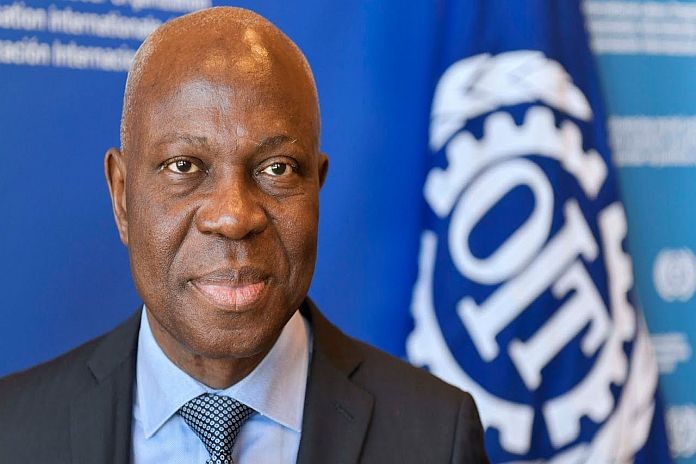In statements to the World Bank and International Monetary Fund Spring Meetings in Washington DC, the ILO’s director-general, Gilbert F. Houngbo, underlined “the crucial need for concerted, coordinated action at all levels” in the face of converging global crises.
GENEVA, Switzerland, (ILO News) – The director-general of the International Labour Organization (ILO), Gilbert F. Houngbo, has called for reinforced multilateralism and a focus on social justice for a sustained global recovery, highlighting the need to bolster investment in social policies, institutions, and dialogue.
In statements delivered at the World Bank (WB) and International Monetary Fund (IMF) Spring Meetings in Washington DC, Houngbo invited relevant parties to join the recently established Global Coalition for Social Justice, which already includes more than 200 partners.
The Coalition aims, “to achieve a greater balance amongst the economic, social, and environmental dimensions of sustainable development, and to promote strong, sustainable and inclusive development through reinforced global solidarity, policy coherence and concerted action among a wide array of stakeholders,” the director-general said. “In this collective endeavour, we need the international financial institutions to ensure that international development not only addresses immediate economic challenges but also lays the groundwork for long-term social and economic resilience in developing countries,” he added.
Referencing the ILO World Employment and Social Outlook: Trends 2024 report, the statements noted that real wages declined in the majority of G20 countries during the year, despite lower global unemployment and positive unemployment growth. Additionally, the number of workers living in extreme poverty increased by around one million globally.
The statements, which were made to the IMF’s International Monetary and Financial Committee (IMFC) and the World Bank’s Development Committee, outlined the challenges of long-term structural transformations in the world of work, including the effects of generative artificial intelligence (AI), the climate transition, and the diverging social protection trajectories of high-income and low-income countries.
Citing the findings of an ILO report on AI, the statements pointed to the need for policy attention to focus on managing the use of AI in the workplace to prevent the technology from enabling violations of rights at work. According to the research the impact of AI on the labour market is set to be significant, with up to 75 million jobs across the world at risk of becoming fully automated. The transformation is more likely to affect workers in high-income countries and women, due to their strong presence in certain clerical occupations.
The director-general also emphasized the urgency of accelerating the climate transition and called for the World Bank Board to take bolder action in scaling up development finance, while indicating that the IMFC needs to greenlight the rechannelling of special drawing rights to social and environmental just transitions.
“Public and private financing is indispensable to expanding green and low-carbon activities, and to transforming environmentally unsustainable business practices, and to attain social resilience and transformation,” the statements said.
In his statements the director-general also noted the “very different” social protection trajectories across the world, as high-income countries edge closer to universal coverage, while low-income countries have reported little progress since 2015. He stressed that under-investment in social protection is one of the main causes of inadequate social coverage. While domestic resources are the cornerstone of national social protection systems, the director-general explained that for low-income countries international solidarity is also essential to bridge the financing gap.





